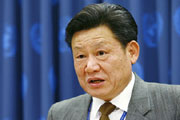UN begins session on sustainable development
The latest session of the UN commission on sustainable use of the world's resources got under way at the UN Headquarters in New York Monday with delegates focusing attention on how best to maintain economic development while limiting the current consumption trends that cause environmental degradation.
 |
|
Under-Secretary-General for Economic and Social Affairs Sha Zukang |
"Changing unsustainable consumption patterns is critical to maintaining our planet's ecological balance," Sha Zukang, the UN under-secretary-general for economic and social affairs, told the commission. "If we are going to meet the Millennium Development Goals (MDGs), address climate change and ensure every person is given a fair chance for a better future, we need to seriously change the way we consume the Earth's resources."
The 18th session of the UN Commission on Sustainable Development is taking place amid growing concerns that present consumer-oriented trends have potentially damaging effects on ecosystems, climate, food and water supplies and human health.
The commission will be reviewing ways to assist countries come up with environmentally-friendly technologies and help corporations to develop greener business models, and consumers to adopt lifestyles that are more sustainable.
The session, which is slated to last until 14 May, will also start a new two-year cycle that will review waste management, transport, chemicals, mining and the 10-year framework of programs on sustainable consumption and production. It will also discuss sustainable development in small island developing countries.
The commission notes that with the Earth's current population of 6.75 billion, consumption and production volumes are expected to continue to rise with demographic growth, severely straining ecosystems. Over 60 per cent of the ecosystem services are being degraded or unsustainably used, it adds.
The high rate of resource consumption has not been evenly shared, with 20 percent of the population in the highest income countries accounting for 77 percent of total consumption in 2005, while the poorest 20 percent used only 1.3 percent.
"Sustainable development requires a transformation of values and principles that directly influence development strategies and lifestyles," said Luis Alberto Ferrate Felice, Guatemala's Environment and Natural Resources Minister and chair of the commission. He said the meeting "will serve as the basis for mobilizing political will for identifying concrete policy actions and measures, as well as partnerships to accelerate the implementation."
Ministers from nearly half of the UN member states are expected to attend the high-level segment of the commission on May 12-14. Representatives from over 1,000 major groups are also expected to attend. The commission will also serve as the launching pad for discussions on the UN Conference on Sustainable Development to be held in 2012.
 0
0 






